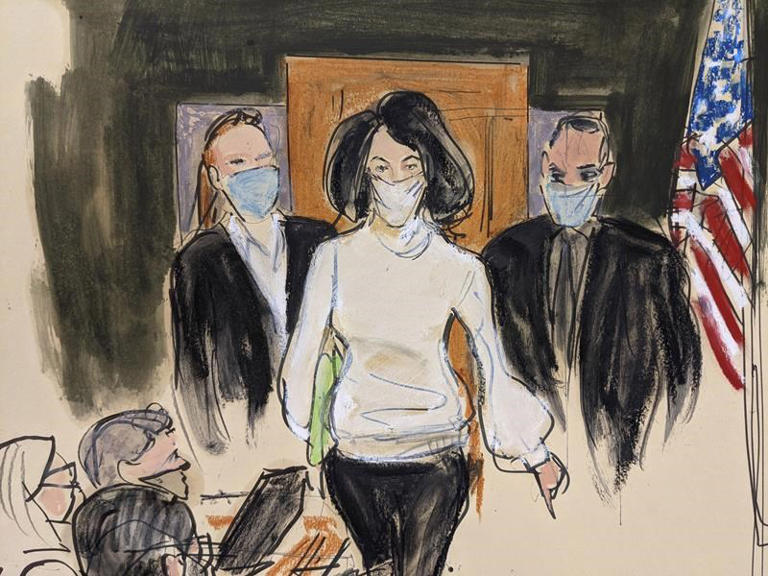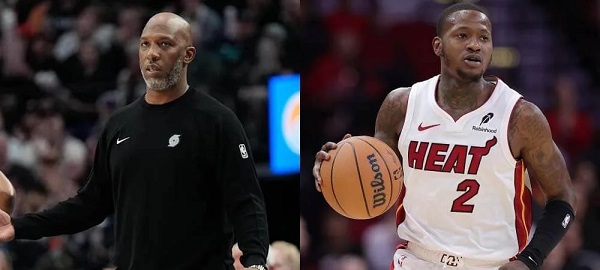International
Ghislaine Maxwell to be sentenced in Epstein sex abuse case

NEW YORK (AP) — Ghislaine Maxwell, the jet-setting socialite who once consorted with royals, presidents and billionaires, is set to be sentenced Tuesday for helping the wealthy financier Jeffrey Epstein sexually abuse underage girls.
The 11 a.m. sentencing in New York is the culmination of a prosecution that detailed how the power couple flaunted their riches and prominent connections to lure vulnerable girls as young as 14, and then exploit them.
Prosecutors said Epstein, who killed himself in 2019 while awaiting trial, sexually abused children hundreds of times over more than a decade, and couldn’t have done so without the help of Maxwell, his longtime companion and onetime girlfriend.
“Maxwell’s conduct was shockingly predatory. She was a calculating, sophisticated, and dangerous criminal who preyed on vulnerable young girls and groomed them for sexual abuse,” prosecutors wrote in a court filing.
In December, a jury convicted Maxwell of sex trafficking, transporting a minor to participate in illegal sex acts and two conspiracy charges. Prosecutors say she deserves 30 to 55 years in prison.
Maxwell, 60, has denied abusing anyone. Her lawyers have asked U.S. District Judge Alison J. Nathan to impose a sentence of no more than five years.
“The witnesses at trial testified about Ms. Maxwell’s facilitation of Epstein’s abuse, but Epstein was always the central figure: Epstein was the mastermind, Epstein was the principal abuser, and Epstein orchestrated the crimes for his personal gratification,” they wrote in a court filing.
Epstein and Maxwell’s associations with some of the world’s most famous people were not a prominent part of the trial, but mentions of friends like Bill Clinton, Donald Trump and Britain’s Prince Andrew showed how the pair exploited their connections to impress their prey.
Over the past 17 years, scores of women have accused Epstein of abusing them. Many described Maxwell as acting as a madam who recruited them to give massages to Epstein.
The trial, though, revolved around allegations from only a handful of those women.
Four testified that they were abused as teens in the 1990s and early 2000s at Epstein’s mansions in Florida, New York, New Mexico and the Virgin Islands.
Three were identified in court only by their first names or pseudonyms to protect their privacy: Jane, a television actress; Kate, an ex-model from the U.K.; and Carolyn, now a mom recovering from drug addiction. The fourth was Annie Farmer, who identified herself in court by her real name after speaking out publicly.
They described how Maxwell charmed them with conversation and gifts and promises that Epstein could use his wealth and connections to help fulfill their dreams.
Then, they testified, she led them to give massages to Epstein that turned sexual and played it off as normal.
Carolyn testified that she was one of several underprivileged teens who lived near Epstein’s Florida home in the early 2000s and took up an offer to massage him in exchange for $100 bills in what prosecutors described as “a pyramid of abuse.”
Maxwell made all the arrangements, Carolyn told the jury, even though she knew the girl was only 14 at the time.
The allegations against Epstein first surfaced publicly in 2005. He pleaded guilty to sex charges in Florida and served 13 months in jail, much of it in a work-release program as part of a deal criticized as lenient. Afterward, he was required to register as a sex offender.
In the years that followed, many women sued Epstein over alleged abuse. One, Virginia Giuffre, claimed that Epstein and Maxwell had also pressured her into sexual trysts with other powerful men, including Prince Andrew. All of those men denied the allegations and Giuffre ultimately settled a lawsuit against Andrew out of court.
Federal prosecutors in New York revived the case against Epstein after stories by the Miami Herald in 2018 brought new attention to his crimes. He was arrested in 2019, but killed himself a month later.
Eleven months later after his death, Maxwell was arrested at a New Hampshire estate. A U.S., British and French citizen, she has remained in a federal jail in New York City since then as her lawyers repeatedly criticize her treatment, saying she was even unjustly placed under suicide watch days before sentencing. Prosecutors say the claims about the jail are exaggerated and that Maxwell has been treated better than other prisoners.
Her lawyers also fought to have her conviction tossed on the grounds of juror misconduct.
Days after the verdict, one juror gave media interviews in which he disclosed he had been sexually abused as a child — something he hadn’t told the court during jury selection. Maxwell’s lawyers said she deserved a new trial. A judge disagreed.
At least eight women have submitted letters to the judge, describing the sexual abuse they said they endured for having met Maxwell and Epstein. Four of them plan to make oral statements at sentencing, including two women — Annie Farmer and Kate — who testified at the trial.
In letters to the judge, six of Maxwell’s seven living siblings pleaded for leniency.
Anne Holve and Philip Maxwell, her eldest siblings, wrote that her relationship with Epstein began soon after the 1991 death of their father, the British newspaper magnate Robert Maxwell.
They said Robert Maxwell had subjected her daughter to “frequent rapid mood swings, huge rages and rejections.”
“This led her to becoming very vulnerable to abusive and powerful men who would be able to take advantage of her innate good nature,” they wrote.
Prosecutors called Maxwell’s shifting of blame to Epstein “absurd and offensive.”
“Maxwell was an adult who made her own choices,” they wrote to the court. “She made the choice to sexually exploit numerous underage girls. She made the choice to conspire with Epstein for years, working as partners in crime and causing devastating harm to vulnerable victims. She should be held accountable for her disturbing role in an extensive child exploitation scheme.”
Larry Neumeister And Tom Hays, The Associated Press
International
Biden’s Autopen Orders declared “null and void”

In a 91-page report released Tuesday, the House Oversight Committee accused Joe Biden’s inner circle of executing and concealing presidential actions without his knowledge, declaring that any orders signed through the autopen were “null and void.” The Republican-led panel, chaired by Rep. James Comer (R-KY), said it uncovered evidence that senior aides used the mechanical signature device to authorize pardons, commutations, and executive directives while Biden’s mental and physical decline worsened — all to preserve “the illusion of presidential authority.”
Joe Biden WAS NOT running the show.
Our new report EXPOSES how Biden's decline was real and his aides covered it up.
Aides didn't even know WHO was operating the autopen to sign official documents and pardons.
Watch the truth they tried to bury 👇🏻 pic.twitter.com/WkQsy5k6uC
— Oversight Committee (@GOPoversight) October 28, 2025
“The Biden Autopen Presidency will go down as one of the biggest political scandals in U.S. history,” the report stated. “As Americans saw President Biden’s decline with their own eyes, his inner circle sought to deceive the public, cover up his condition, and took unauthorized executive actions that are now invalid.” The committee urged the Justice Department to launch a full criminal investigation into what it called a “cover-up of historic proportions,” naming several aides who invoked the Fifth Amendment when questioned about their roles. It also demanded the D.C. Board of Medicine investigate Biden’s physician for allegedly hiding his true medical state.
According to the report, internal emails and documentation revealed a “haphazard process” surrounding clemency and other executive actions, with no reliable record confirming Biden’s personal approval. Comer said the findings raise profound constitutional concerns. “If unelected aides were using the autopen to execute presidential powers without Joe Biden’s knowledge or consent, that is an assault on the Constitution itself,” he said.
The White House has not yet responded.
Canada Free Press
The real genocide is not taking place in Gaza, but in Nigeria

From Canada Free Press
Global conflict has reached its highest level since World War II, fueled by a surge in terrorist insurgencies, political upheaval, and full-scale wars in Ukraine, Gaza, Sudan, and dozens of other regions. According to the Peace Research Institute, there are 61 active conflicts across 35 countries.
In the longstanding and brutal ledger of religious persecution, Nigeria now occupies its own grim chapter with its enduring pogrom against Christians. Nigeria is the largest populated nation on the African continent and has become the crucible of suffering for its Christian minority.
Nigeria’s Christian communities are enduring one of the worst persecutions in modern times, yet the world treats it as a nonstarter
Islamic insurgents strike at night, torching homes while families sleep. They ambush churches during Sunday services, gunning down entire congregations. They raid Christian farming villages, slaughtering men, raping women, and abducting children. These are coordinated acts of religious cleansing with survivors forced to convert to Islam or be killed.
The violence throughout the years against Christians in Nigeria has only intensified. According to the Nigerian watchdog group Intersociety since 2009 more than 52,000 Christians have been killed and over 20,000 churches have been desecrated or destroyed.
These are not isolated events.
In 2024, 4,100 Christians were killed in Nigeria that was 82% of all Christian martyrdoms worldwide. By August 2025, more than 7,000 were killed.
This surge reflects not just a crisis of security, but a deepening pattern of persecution that is nothing short of genocide. As the Church marks each martyrdom with prayer and remembrance, the Body of Christ in Nigeria continues to suffer wounds that cry out for justice, solidarity, and global witness.
Global Christian Relief and other worldwide monitors have named Nigeria the deadliest country for Christians, a title that reverberates with the quiet void of global indifference.
These atrocities are driven by a network of Islamist extremist groups that include Boko Haram, Fulani militias and dozens of other factions with ties to ISIS and al-Qaeda. Their coordinated campaigns have devastated Christian communities not only across Nigeria but the entire African continent at an alarming rate that continues unabated.
The silence of the world echoes the hush of Good Friday when injustice at its zenith and was dismissed as routine, while suffering and death was business as usual. Nigeria’s Christian communities are enduring one of the worst persecutions in modern times, yet the world treats it as a nonstarter.
Before leaving office in 2020, the Trump administration took action by placing Nigeria on the State Department’s list of “Countries of Particular Concern,” (CPC). The CPC list allowed for economic sanctions to pressure Nigeria’s government to protect Christians and other religious minorities from violence.
However, in 2021, the Biden Administration removed Nigeria from the CPC even as the massacres intensified without due cause.
As a result, the Nigerian government, through either willful complicity or gross negligence, has enabled these atrocities to persist unchecked. Its failure to act is a betrayal of its citizens.
In response to the ongoing Nigerian massacre, a coalition of religious leaders, spearheaded by Nina Shea of the Hudson Institute’s Center for Religious Freedom, sent a petition to President Trump on October 15 condemning the Nigerian government’s treatment of religious minorities and urging Trump to redesignate Nigeria to the CPC. Among the signatories were San Francisco Catholic Archbishop Salvatore Cordileone, Family Research Council President Tony Perkins, Focus on the Family President Jim Daly, among dozens of others.
The petition unequivocally states that the Nigerian government “is directly violating religious freedom by enforcing Islamic blasphemy laws that carry the death penalty and harsh prison sentences against citizens of various religions. It also demonstrably tolerates relentless aggression uniquely against Christian farming families by militant Fulani Muslim herders, who appear intent on forcibly Islamizing the Middle Belt.”
This crisis transcends geopolitics and foreign policy and is in desperate need of a moral imperative. As St. Paul affirms in 1 Corinthians 12:26, “If one member suffers, all suffer together.” As members of the Body of Christ, Christians are called to bear witness, speak out, and act to end the atrocities unfolding across Africa.
Without intervention, the Christian population in many regions faces displacement within a generation.
Don’t think it can’t happen here.
-

 Business3 hours ago
Business3 hours agoTrans Mountain executive says it’s time to fix the system, expand access, and think like a nation builder
-

 Business1 day ago
Business1 day agoThe painful return of food inflation exposes Canada’s trade failures
-

 Business1 day ago
Business1 day agoCBC uses tax dollars to hire more bureaucrats, fewer journalists
-

 Sports2 days ago
Sports2 days agoWhile Ohtani marches into MLB history, Nippon league’s shame lingers
-

 Alberta1 day ago
Alberta1 day agoCoutts border officers seize 77 KG of cocaine in commercial truck entering Canada – Street value of $7 Million
-

 National1 day ago
National1 day agoElection Officials Warn MPs: Canada’s Ballot System Is Being Exploited
-

 Business1 day ago
Business1 day agoPaying for Trudeau’s EV Gamble: Ottawa Bought Jobs That Disappeared
-

 Bruce Dowbiggin1 day ago
Bruce Dowbiggin1 day agoIs Roundball A Square Game? Sports Betting Takes Another Hit









